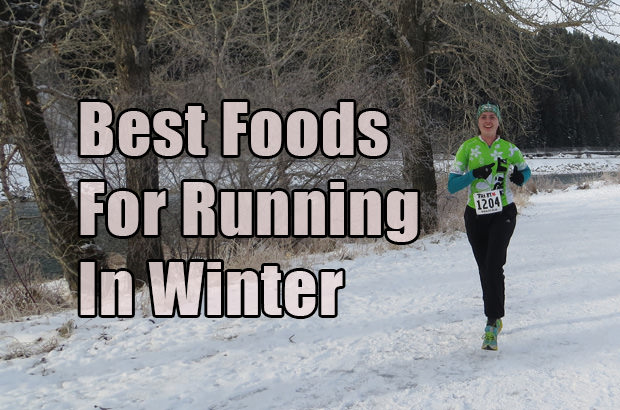
Best Foods For Running In Winter
Posted on 01 Feb, 2020

In the summer, your body sweats heavily to dissipate heat. But in the winter, the warmth helps you survive in a cold environment. Because food provides the fuel needed to generate this heat, the right diet is particularly important for runners who are exposed to extreme cold.
Here are our top tips for winter nutrition to stay in peak condition.
Oily Fish
 During the winter, the reduction in sunlight hours and natural habit of layering up with clothing means that we receive less UV exposure and therefore produce less Vitamin D. A recent UK survey found 50 per cent of the population is deficient in vitamin D and 16 per cent have a severe deficiency during winter.
During the winter, the reduction in sunlight hours and natural habit of layering up with clothing means that we receive less UV exposure and therefore produce less Vitamin D. A recent UK survey found 50 per cent of the population is deficient in vitamin D and 16 per cent have a severe deficiency during winter.
It has long been established that Vitamin D plays a very important role in bone health as it aids calcium absorption, but in more recent years the impact on our wider health has also been better understood. Less sunlight can affect your mood and can increase your susceptibility to autoimmune disease such as multiple sclerosis, rheumatoid arthritis, type 1 diabetes and certain cancers.
Runners are obviously protected to a certain extent by exposure to the great outdoors, but even we can benefit from eating foods such as oily fish, rich in Vitamin D.
A 2007 Tufts University study also found that arthritis pain increases incrementally for every 10° F drop in temperature. Even those without arthritis often notice a spike in stiff or achy joints during winter.
Anti-inflammatory omega-3s, found in abundance in such fatty fish as salmon, help reduce joint inflammation and even soothe exercise-induced muscle soreness.
Have Warming Foods
 A drop in body temperature can stimulate your appetite, causing you to search for food. Thirty to 60 minutes after you eat, your body generates about 10 percent more heat than when you have an empty stomach and contributes to rapid recovery. This increased metabolism stems primarily from energy released during digestion.
A drop in body temperature can stimulate your appetite, causing you to search for food. Thirty to 60 minutes after you eat, your body generates about 10 percent more heat than when you have an empty stomach and contributes to rapid recovery. This increased metabolism stems primarily from energy released during digestion.
Coming home to a cold salad after a long winter run isn’t that appealing. What you should do instead is to go for some reassuring winter food; hot cocoa, steaming soup, mulled cider or a bowl of chilli. Soups are great and even better if they’re home-made. Choose soups made from in-season vegetables, like squash, pumpkin and lentils.
In comparison, cold foods and fluids chill your body. Research subjects who ate a big bowl of ice cream in five minutes experienced a drop in fingertip temperature of two degrees F in the first five minutes, five degrees in 15 minutes. In summer, this cooling effect is desirable, but in winter, hot foods are the better way to warm yourself. Eating warm food after a run in the cold not only boosts recovery but helps suppress your appetite so you don’t overeat.
Emergency Food
 It’s always good to carry an energy bar or a bag of dried fruit and nuts in your pocket in case an unexpected fall leaves you stranded in a frigid environment.
It’s always good to carry an energy bar or a bag of dried fruit and nuts in your pocket in case an unexpected fall leaves you stranded in a frigid environment.
When you first become slightly chilled, you'll start to shiver. Shivering is nature’s way of keeping you alive as it involves involuntary muscle tensing that generates heat and offers a warming effect. This isometric type of muscle tensing can increase your metabolic rate by two to four times.
As you get further chilled, your shivering will get more intense, and this can deplete your muscle glycogen stores and energy very quickly. This is when you'll be glad you had some emergency food in your pocket!
Aim to have five to six smaller meals and snacks each day. The aim is to eat every three hours. Each meal should be based on fruit and vegetables, slow-release carbohydrates to provide long-lasting energy, and lean protein, which is needed for muscle repair.
Drink Your Quota
 Dehydration hinders performance, so it is very important that we replace fluid lost during exercise. Unfortunately, not drinking enough fluids is a major problem among winter athletes—runners, skaters, skiers and hikers alike.
Dehydration hinders performance, so it is very important that we replace fluid lost during exercise. Unfortunately, not drinking enough fluids is a major problem among winter athletes—runners, skaters, skiers and hikers alike.
Cold blunts the thirst mechanism; you'll feel less thirsty despite significant sweat loss. Winter athletes also experience respiratory fluid loss, which is water that gets lost via breathing. When you breathe in cold, dry air, your body warms and humidifies that air. As you exhale, you lose significant amounts of water.
Some winter athletes purposefully skimp on fluids because urinating can be problematic—too much hassle to shed layers of clothing. We recommend drinking regularly during the day but taking small sips during your run. Then have a big drink when you get back.
You need over two litres of water a day. This can come from low-sugar squash, herbal teas, fruit juice or sports drinks. Caffeine will dehydrate you, so limit tea and coffee.
Photo Credits
Great Books On Nutrition For Runners

by Joanna Sayago Golub

by Shalane Flanagan

by Joanna Sayago Golub

by Matt Fitzgerald

 Basic Calisthenics
Basic Calisthenics What The Extra Shoe Lace Hole In Your Running Shoe Is For
What The Extra Shoe Lace Hole In Your Running Shoe Is For The Day After The Marathon
The Day After The Marathon Is The Paleo Diet Suitable For Runners?
Is The Paleo Diet Suitable For Runners?










